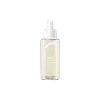What's inside
What's inside
 Key Ingredients
Key Ingredients

No key ingredients
 Benefits
Benefits

 Concerns
Concerns

 Ingredients Side-by-side
Ingredients Side-by-side

Olea Europaea Fruit Oil
MaskingEthylhexyl Palmitate
EmollientSorbeth-30 Tetraoleate
EmulsifyingOryza Sativa Bran Oil
EmollientGlycine Soja Oil
EmollientPogostemon Cablin Leaf Oil
MaskingParfum
MaskingOryza Sativa Bran Extract
Skin ConditioningCentella Asiatica Extract
CleansingPolygonum Cuspidatum Root Extract
AntioxidantScutellaria Baicalensis Root Extract
AstringentCamellia Sinensis Leaf Extract
AntimicrobialGlycyrrhiza Glabra Root Extract
BleachingChamomilla Recutita Flower Extract
MaskingRosmarinus Officinalis Leaf Extract
AntimicrobialOlea Europaea Fruit Oil, Ethylhexyl Palmitate, Sorbeth-30 Tetraoleate, Oryza Sativa Bran Oil, Glycine Soja Oil, Pogostemon Cablin Leaf Oil, Parfum, Oryza Sativa Bran Extract, Centella Asiatica Extract, Polygonum Cuspidatum Root Extract, Scutellaria Baicalensis Root Extract, Camellia Sinensis Leaf Extract, Glycyrrhiza Glabra Root Extract, Chamomilla Recutita Flower Extract, Rosmarinus Officinalis Leaf Extract
Ingredients Explained
These ingredients are found in both products.
Ingredients higher up in an ingredient list are typically present in a larger amount.
Oryza Sativa Bran Extract comes from the outer layer of a rice kernel. It is a byproduct of milling rice, or the operation to produce a whole grain rice product.
This ingredient has moisturizing properties due to its components of polysaccharides and omega-3 fatty acids. It also contains calcium, selenium, phosphorus, iron, and zinc.
Oryza Sativa Bran Extract contains numerous antioxidants such as ferulic acid. Antioxidants help fight free-radical molecules. Free-radical molecules are capable of damaging our cells and other genetic material.
Learn more about Oryza Sativa Bran ExtractOryza Sativa Bran Oil comes from the outer layer of a rice kernel. It is a byproduct of milling rice, or the operation to produce a whole grain rice product.
This ingredient has emollient and skin conditioning properties. This is due to its polysaccharides and omega-3 fatty acids.
Emollients help soothe and soften the skin. It does this by creating a protective film on your skin. This barrier helps trap moisture and keeps your skin hydrated.
Learn more about Oryza Sativa Bran OilParfum is a catch-all term for an ingredient or more that is used to give a scent to products.
Also called "fragrance", this ingredient can be a blend of hundreds of chemicals or plant oils. This means every product with "fragrance" or "parfum" in the ingredients list is a different mixture.
For instance, Habanolide is a proprietary trade name for a specific aroma chemical. When used as a fragrance ingredient in cosmetics, most aroma chemicals fall under the broad labeling category of “FRAGRANCE” or “PARFUM” according to EU and US regulations.
The term 'parfum' or 'fragrance' is not regulated in many countries. In many cases, it is up to the brand to define this term.
For instance, many brands choose to label themselves as "fragrance-free" because they are not using synthetic fragrances. However, their products may still contain ingredients such as essential oils that are considered a fragrance by INCI standards.
One example is Calendula flower extract. Calendula is an essential oil that still imparts a scent or 'fragrance'.
Depending on the blend, the ingredients in the mixture can cause allergies and sensitivities on the skin. Some ingredients that are known EU allergens include linalool and citronellol.
Parfum can also be used to mask or cover an unpleasant scent.
The bottom line is: not all fragrances/parfum/ingredients are created equally. If you are worried about fragrances, we recommend taking a closer look at an ingredient. And of course, we always recommend speaking with a professional.
Learn more about ParfumThis ingredient is commonly known as Patchouli oil.
Patchouli exhibits slight antibacterial and antifungal activity from its patchoulol and alpha-patchoulene content.
However, it also contains known skin-irritating fragrances. A study from 2015 found limonene and camphor as active components of this ingredient.
Limonene and camphor are both known EU allergens.
Learn more about Pogostemon Cablin Leaf Oil